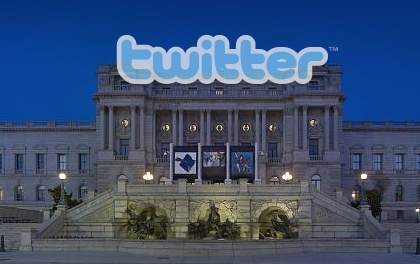
While I was preoccupied filing taxes last week, the Library of Congress announced a deal with Twitter. Basically, Twitter will donate all public tweets, past, present, and future, to the LoC for archival purposes. Twitter elaborates:
It is our pleasure to donate access to the entire archive of public Tweets to the Library of Congress for preservation and research. […] after a six-month delay can the Tweets be used for internal library use, for non-commercial research, public display by the library itself, and preservation.
I’d think the publicly funded and lofty Library of Congress would have more meaningful projects to prioritize ahead of rescuing Twitter from their inability to provide more than a few days of searchable tweets (without bringing down the server farm). But what do I know, there’s probably quite a few needles in this pop culture haystack that we’ll reflect on years from now.
I do have a few logistical questions for the parties, though. Not because I’m personally concerned, but to stimulate a dialog as we engage in this new era of open online communication.
It goes without saying that Twitter reserves the right to share our tweets. In fact, that’s their obvious and number one function. Yet I wonder if their privacy policy will be updated to reflect the magnitude of this data dump and if it’ll occur before Twitter makes the first handoff. Related, when exactly does that happen? Also, if I were to delete a tweet, would it be retroactively deleted from the Library of Congress’ archive in the following 6 month db transfer? What about a username change? Better yet, is there a method for users to opt-out without making all future tweets private? Lastly, a large percent of Twitter participation occurs outside the US. And will foreign entities care that our government is taking possession of the entire Twitter archive? (When the same opportunity may not exist for them.)
Biz changed the ToS back in September:
“…Ownership—Twitter is allowed to “use, copy, reproduce, process, adapt, modify, publish, transmit, display and distribute” your tweets because that’s what we do. However, they are your tweets and they belong to you.”
http://blog.twitter.com/2009/09/twitters-new-terms-of-service.html
As to your wondering about “delete”, your tweets are now being instantly cached on both Google and Bing the millisecond you click the ‘Tweet’ button – using the little trash can button inside your Twitter account is really just so *YOU* don’t have to look at that errant tweet any more. To put this in perspective – every email you have ever sent is no longer in your control, not only do all the recipients have a copy, that email was cached on myriad mail servers along the way.
Finally, post seems to condescend Twitter, dismiss the importance of the data set as a whole. All out tweets, collectively, represent a priceless and extremely important body of knowledge – of course it should be in the library of Congress.
Reminder – Twitter nearly toppled the Iranian dictatorship back in the summer of 2008.
To reiterate, I an in no way personally concerned. I operate under the assumption that everything I do online is public and searchable. However, I’m not sure most do (especially the younger crowd or the less tech savvy) and the implications fascinate me. As do the unanswered questions I pose above.
I will ask Sean ( @sg ) to jump in here and answer your questions, Dave.
In the mean time, you can call Matt Raymond directly at the LoC (202) 707-2905
Ref.
http://www.loc.gov/today/pr/2010/10-081.html
Please, say it isn’t so! This has to be one of the biggest WTF’s in a while.
I can’t believe that the LoC would accept this blather. What’s next, all postings written on bathroom stalls (some much more intelligent than your average “tweet”)?
Obviously some “twitteati” is placed WAY too high in the government.
More important than an opt out option on Twitter (which I’ve already exercised by not signing up to begin with), where’s my opt out option for massive government waste?
Dave,
I thought Ars Technica summed up many of your questions.
“Why the Library of Congress cares about archiving our tweets”
http://arstechnica.com/tech-policy/news/2010/04/why-is-the-us-govt-archiving-your-tweets-we-ask-them.ars
While as to the quality of tweets (your excepted of course) may be summed up by the College Humor video:
I get that the effects of “twittering” should be documented and I think it would be much more significant to undertake a project that delivers numbers and stats on how Twitter was used in the Obama Presidential Campaign, in Iran, and other such significant events. But I just don’t think the incessant Twitter stream of consciousness needs to metaphorically or physically sit alongside documents from the great and creative minds of our nation